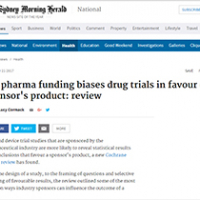
The latest Cochrane Review on Industry sponsorship and research outcome has attracted much media interest over the past few weeks. The updated review includes 27 new studies and provides definitive evidence that pharmaceutical industry funding of drug studies biases results and conclusions to look favourable towards the drug of the sponsor.
Cochrane Co-Chair and lead review author Lisa Bero took to the airwaves to highlight the findings and explain how sponsored drug and device trial studies are more likely to reveal statistical results and conclusions that favour a sponsor's product. She was interviewed on ABC Radio Melbourne, 2GB Sydney, 4BC Brisbane, 2CC Canberra, Curtin FM and Power FM. Lisa also featured in further coverage of the review in the Sydney Morning Herald, Courier Mail, SBS News Online, The Age, The Australian, The Canberra Times, Gold Coast Bulletin, and assorted regional newspapers around Australia.
‘We are definitely advancing pharmacotherapy by having drug industry-funded studies,’ Lisa said. ‘But what our findings argue is that the evaluation of the drug should be separate from the companies manufacturing them. We need bias assessments tools for drug studies that take funding source into account.’
Lisa also featured in a Canberra Times report focusing on another facet of big pharma's undue influence – this time on health professionals. The first tranche of data on drug company payments to doctors, nurses, health professionals and academics in Australia has been released as part of a transparency program by drug industry lobby group Medicines Australia. It shows global pharmaceutical industry giants paid out at least $9.5 million to doctors and nurses to attend events and offer advice over six months in 2016. Previous data releases have shown the industry spent more than $64 million in 2015 on direct payments to doctors, funding events and sponsorship of other groups around Australia.
‘The data collected on payments to health professionals in Australia is relatively scant compared to similar data releases in the United States,’ Lisa said. ‘In addition to the three categories of payment covered in Australia – registration fees for events, travel and accommodation, and fees for service and consultancy – the US data includes honoraria, entertainment, investments and grants provided to the recipients.'
'So while it's hard to draw key conclusions from the more limited data we have access to here, if the frequency of the transaction continues over a longer period, we'll be able to see if there's a consistent and steady relationship between the companies and practitioners. It will be interesting to see if the same people feature over time. Getting a clear picture about this is very important, especially given the growing body of evidence showing that even small amounts of industry funding could influence the prescribing decisions of medical practitioners.’
